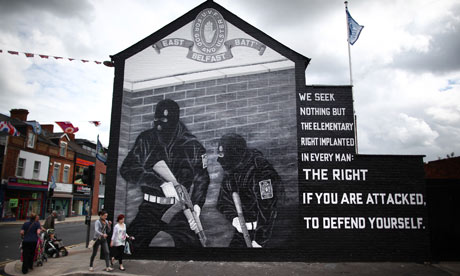I wanted this post to be one of those witty, eloquent ones. Where my words flow out as naturally as thoughts. Instead, I've been sitting here rubbing my eyes for 15 minutes; I keep writing sentences and always end up erasing them. Grrr...The gift of words does not belong to me today. If you can bear with me, I hope it will be worth it.
Ireland is not exactly what I expected...
Well, to clarify,
Northern Ireland is not exactly what I had expected. I didn't even come in with a lot of set expectations. I don't know what I was thinking it would be...rainbows and leprachans and green rolling hills full of redheaded children. While that kind of explains it, what I never knew about Ireland is the underlying turmoil that exists. I mean, I knew that thinks haven't always been hunky-dory over here (i.e. potato famine), but surely things are good now?
It's a bit complicated, by which I mean really complicated, but basically Northern Ireland is a part of the United Kingdom (along with Wales, England and Scotland) and the southern section of the island is its own country (Republic of Ireland). Some of the people here are pretty okay with this arrangement. They represent the loyalist population and at least in Belfast, show it quite proudly by displaying the Union Jack all through their neighborhoods, painting murals and starting defense task forces like the Ulster Freedom Fighters (UFF) and Ulster Defense Association (UDA). (Ulster is the province that contains all of Northern Ireland and is used as another name sometimes.) Others, called nationalists, think that the island of Ireland should be united into one country outside of British rule. Due to historical reasons that I can't explain/won't go into, protestants are usually loyalist and catholics are usually nationalist. There are obviously exceptions to this, but people here tend to use the terms interchangeably.
Anyhow, in 1920, Ireland was split into the North and South and then violence really began in the late 60's and lasted clear through the 90's. This period of time was known as "The Troubles" and basically represents decades of hatred, fighting and extreme acts of violence. It's hard to expain, but there are Protestant neighborhoods (loyalist), Catholic neighborhoods (nationalist) and neutral zones.
(Red= protestant, Green=Catholic)
Groups on one side would kill people on one side, and then the others would get revenge and so on. All this tension built into pressure for something to change, so in 1969, temporary walls were put up. These were only meant to last six months, but grew into 99 permanent structures towering as high as 40 feet. While a few gates through are open during each day, most gates remained closed and are only open once or twice a year. Protestants and catholics are live pretty much segregated lives. They have separate schools, community centers, stores and communities. Often times, university is the first time they ever come in contact with each other. This type of separation leads to even more misunderstanding. Violence has mostly dwindled with the occasional random outbreak. Some areas are worse than others, but regardless, hatred continues. Belfast is hoping to have the walls down by 2023, but a lot of community growth has to happen first. Many people still see the walls as their security. The problem isn't gone. A recent decision about flag flying at city hall threw the cities into over a month of rioting (google it).
People still don't feel safe and why would they? The city is full of paramilitary groups on both sides, violent murals and a lack of communication.
This bottom mural no longer exists, but it was a part of the neighborhood we will be working in for a week in August. We visited this week and it was heart-wrenching. I haven't felt that surrounded by darkness since I visited migrant camps in Mexico. I watched a 7 year old drop the f-word like it was commonplace. The kids are almost mean, but you can't blame them. They've grown up in a place where they have to be. Honestly, my heart aches for the people of Belfast and Northern Ireland. Seeing lives ripped apart by an old conflict sucks. And I can't understand it either.
So many things are confusing about it. What does it have to do with religion? Can't we talk this one out? It's manic, but to them it's just life. Yesterday, a guy named Jim who works with an organization that works to orchestrate cooperation on both sides of the wall took us on a tour and gave us all the history. So many people needlessly died, a lot were just innocent civilians taken out by bombings or shootings. It makes me hurt inside just thinking about it. I can't imagine living through the troubles or even in the aftermath of them.
I can't wait to go love those kids. It's going to be hard, but just knowing what they are living helps so much. I hope you will join me in praying for the people of Northern Ireland. As I reflect on this, I'll probably have more thoughts about it, but typing it all out made me exhausted all over again, so I'll get back to you.
I signed the peace wall between Shankill and Falls. The three blocks next to this on the Protestant side are vacant because they don't want to deal with the violence anymore. The Catholic homes that but up to it have backyards that are fully enclosed in a cage-like structure so nothing gets thrown in.
Reconciliation between the two sides would be incredible. The combined community resources would benefit them economically, integration would lead to a more peaceful existence and definitely more progress when it comes to deciding the future of Ireland. I guess at this point we can only pray, hope and love each other. Cannot wait for the day we see these walls come down.
















.jpeg)
.jpeg)

